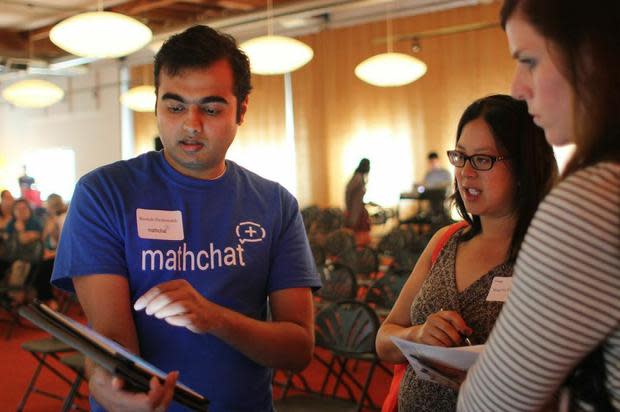How Imagine K12 accelerates educational tech startups

Image: Imagine K12
Nearly every aspect of life, from commerce to dating, has reacted to technological shifts in the world.
That's why Imagine K12 founders Geoff Ralston, Tim Brady, and Alan Louie thought it was odd that the educational system was lagging behind all the changes wrought by the connected world.
"The education system just didn't seem to have reacted and changed," Ralston said. They wanted to help.
So, they launched a startup accelerator. Imagine K12 focuses on educational technology. Ralston and Brady knew each other from Yahoo and Louie came from companies like Shutterfly, Google, and Netscape.
In 2006, Ralston and Louie had tried to launch an education startup but failed. Ralston said it felt too early. The experience did spur them to take a look at the field and come to the conclusion that creating another startup was not, perhaps, the best option for them.
"The problem with a startup is that any single startup has a relatively high probability of failure and we wanted to have more shots at it than that and that's where we hit upon the idea of doing an accelerator," he said.
From there, they approached Y Combinator founder Paul Graham -- also from Yahoo once upon a time -- expecting to be told their idea was junk.
On the contrary, Graham thought it was a good idea and offered to help.
Imagine K12 launched at the end of 2010, and using a similar program structure to Y Combinator, took on its first cohort of startups in the summer of 2011.
"If you're going to have a party, you have to get guests," Ralston said. They received hundreds of applications and accepted 10.
In the time since, there have been a few changes. Louie went off and decided to focus on early childhood literacy. Imagine K12 also scaled back from 2 cohorts a year, to just one which goes through the program September through December, with a demo day in January.
The program works like this: Each company received $14,000-$20,000 once they're accepted. After presenting at Demo Day in January, they get a convertible note for $80,000 which comes from the Imagine K12 Start Fund.
In between, the startup founders get mentorship and training, including guest speakers, seminars covering legal incorporation, public relations, finance, product design, etc., and access to teachers in residence.
They also have access founders who have already gone through the program.
"That's incredibly valuable to the companies because a lot of the things that you go through in starting a company have been gone through already by other companies," Ralston said.
Regardless of the type of business, trying to get a startup off the ground is difficult.
"It's really hard in about every way you can think about being hard. It's really hard intellectually, it's hard because it's an amazing amount of work, and it's hard because you're usually going to fail," Ralston said.
For those in the educational tech space, there are a few distinctive challenges, though, including overcoming skepticism from venture capitalists. Ralston said these types of companies just weren't what VCs believed in. He hopes, though, that Imagine K12 has played some role in changing the attitude.
Ralston said within the past year, venture capitalists have probably invested about a billion dollars in educational tech startups, which is more than ever before.
Of the companies that go through Imagine K12, Ralston said there are generally three types: teacher tools, learning tools, and administration tools.
A teacher tool might be something like ClassDojo, which deals with behavior management. A learning tool could be Kodable, which teaches programming concepts to pre-literate children. An administrative tool could be Securly, which is a web filter designed for schools.
After Imagine K12
Ralston said after Demo Day, startups can take up to a year to raise more funding, but more than 60% so far have been able to.
Plus, just because they're out of the program doesn't mean they're out in the cold.
"One of the points we like to make to companies that join, is that the relationship really never goes away," Ralston said.
He and Brady continue to work with companies on fundraising strategies, or on anything they might need with regard to building a company.
And in this way, as Ralston said, they have multiple shots at impacting the ed tech space.
"I like to think of it as this gravitational force outside of the normal educational infrastructure where knowledge, information, and consumable educational content is being created and inevitably having a huge impact just because of it being there on the educational system," he said.

